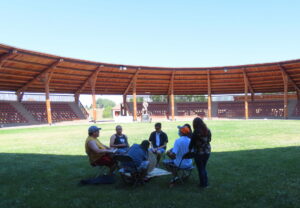1.2 Mentorship and Learning
Learning about Farming
There are so many ways to learn, how do you learn best?

You can learn about farming by reading books (and this guide!), watching videos, reading websites, talking to people, visiting farms, but most of all, try farming! Talk to people who are farming in your area, and volunteer with them for a week (or more), and get a sense of what the day to day tasks are. Many people work on other farms for a few years to learn before going out on their own, while others get university certificates, and other just start! You will find your own path.
Make Connections
You will need a couple of people that you can call to help when you need it (make sure to repay the favor!). When your onions have all died and you have no idea why, or your apples are full of worms, or the fall rye just isn’t growing well, you will need someone (or different people) to call.
Many farmers suggested creating a network of other farmers, especially in nearby growing areas like Vernon, Kelowna, or Enderby; farmers will share information when you ask them questions. Keep in mind that things that work for them, might not work on your farm, so having a larger network is important. You are limited when you only talk to the few growers close to you.
Attending events like Seedy Saturdays and conferences (especially the COABC and BCAFM Conferences) when they are in your area, is important! You will meet people, and you will learn a lot from them when you spend the weekend at the conference.
You can also connect with your local industry associations. Go to farmers’ institute, join forage council, or the BC Agriculture Council. The closest one to Kamloops is Chase Farmer’s Institute.

You are always learning
One of the wonderful (and frustrating!) things about farming is that you are always learning, whether you plan to or not! There might be an unexpected heat wave, a new pest eating your crops, the chickens are not growing as quickly as usual, and you will have to find a solution. You can plan as much as you can, but flexibility is important in this industry.
Activities: How do I learn?
How do you learn best? Think about what information you will need in the first few years, and where you will find it.
- What past experience do you have that you learned from?
- Who can you reach out to with questions?
- Are there other people that you want to learn from?
- What areas do you still need to learn more about?
- How will you find that knowledge?
- Do you like books, websites, YouTube videos, online courses, post-secondary programs, or from other people?
TRU Sustainable Ranching Field Trip Schedule 2022
One great way to visit lots of other local farms is to attend the TRU Sustainable Ranching field trips. Visit their website for information on how to get in touch with them and ask about attending the free field trips.
